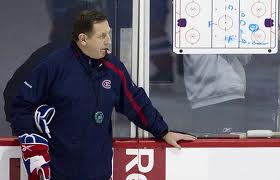by Coach K, AllHabs.net
SAINT-LAZARE, QC.–Everyone looks at coaching in the NHL as a glorified job, where you get to be on the ice all the time, and you get to do what you love for a living. The truth is there’s no glory, unless you have limitless success. That doesn’t mean winning the Stanley Cup every year, which is the measuring stick by which we gauge our beloved Canadiens. It means having reasonable goals, attaining them, and working towards continued success in the future.
Within the coaching fraternity, there is an understanding that each coach has a limited window in which to create a successful environment. In a city like Montreal, with its hockey-crazed fans and media, this window is even smaller. Success is not something that can be attained, it’s expected. This situation is only one of the many issues a coach faces in the political side of coaching hockey.
Coaches need to be born leaders. They need to have thick skin and a strong backbone, not to mention they are expected to be an encyclopedia of hockey knowledge, regardless of previous experience. They also need to be good communicators, who can convey messages to their players, without insulting them or hurting their confidence. A good coach can also recognize which players he can push hard, and which ones he has to treat with kid gloves.
The problem is that within a hockey organization, there are outside factors that dictate some of the decisions a coach needs to make, for example, the General Manager of a hockey club. Because the GM signs the players to contracts, many of the on-ice decisions are sometimes dictated to a coach. A good example is a situation that arose when Bob Gainey took over the reigns of the Montreal Canadiens, back in 2003.
There was a point in the 2005-2006 season, the first after the infamous NHL lockout, where then Canadiens’ goaltender, Jose Theodore, was struggling. With the media pressure that came from Thoedore’s supposed friendship with the notoroius Hell’s Angels and his uncle’s alleged illegal activities, his game began to crumble. Julien recognized this, and began his backup goaltender, Cristobal Huet, on a more frequent basis. Mr. Gainey didn’t agree with Julien’s decision to sit Theodore. One reason was because of the contract that Theodore was being paid, and the second was because of his Hart trophy performance in the last full season. Julien started Theodore, who continued to struggle. When Julien again started Huet, he was subsequently fired, regardless of the fact he had a winning record during his three year stint with the Habs.
Was Gainey wrong? I guess the fact he traded Theodore away to Colorado for David Aebischer was the answer to that question.
A general manager’s role, with any team, is to provide them with a roster of players that best fits the style of play he wants to exhibit. Once that’s done, it’s up to the coach to use those assets, to the best of his abilities, to gain that goal. A GM must allow his coach to make on-ice personnel decisions, in order to better his team’s performance.
The same can be said of the current situation on the Canadiens. I am of the opinion that Canadiens’ coach Jacques Martin (who has be on both sides of the coach’s and general manager’s fence) doesn’t have the intestinal fortitude to make coaching and/or roster decisions. He bullies his rookies, while his veterans and high-price players can do no wrong. Part of the blame certainly goes to current general manager, Pierre Gauthier, for not supporting his coach and letting him know it’s okay to make stern decisions.
The majority of the blame, however, must be given to Jacques Martin, who as a coach needs to be up front with his players, sit who needs to be sat out because of lack of performance, and once in a while, stand up and tell the general manager to give him some space to do his job. He needs to let Mr. Gauthier that he’ll be the one making on-ice decisions, and that he’ll consult the GM if and when he may need his advice.
In today’s NHL, some of the most talented players are difficult to sign when they see how others are mistreated by an organization, whether they are rookies or veterans. It also becomes apparent to them, and their agents, that certain organizations are reluctant to uphold any organization standards they may claim to have, because MONEY TALKS!!!
